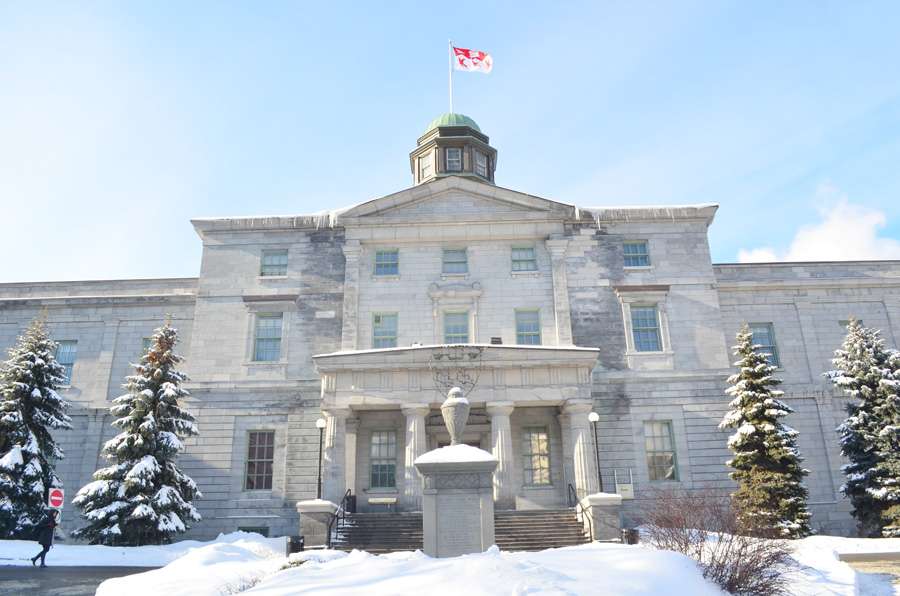On April 27, the McGill Board of Governors (BoG) met to discuss the resignation of Andrew Potter, the challenge of defining campus borders when applying the McGill context, and plans for the Provost’s Task Force on Indigenous Studies and Indigenous Education. The BoG also outlined objectives for repairs and restoration of campus infrastructure, reviewed plans for changes to McGill’s existing software, and discussed dead property and empty space on McGill’s Macdonald campus.
Suzanne Fortier’s Comments on Andrew Potter’s Resignation
Associate Professors Darin Barney and Derek Nystrom asked Principal Suzanne Fortier about the resignation of Andrew Potter from his position as the director of the McGill Institute for the Study of Canada (MISC). Potter’s resignation followed the publication of a column he authored in Maclean’s magazine on March 20. The article linked the shutdown of a major highway during a snowstorm on March 14 with the lack of trust within Quebec society. Fortier explained that Potter was not clear enough in distinguishing his views from those of the University.
“It is impractical, every time you open your mouth, to say, ‘These are my views, not the views of the university,’” Fortier said. “But there are circumstances where we need to consider whether [making this disclaimer] is needed or not.”
Fortier reminded the BoG of the university's commitment to serve Quebec and alluded that Potter failed to do so with his controversial article.
“We express a view all the time of pride of being a university of Quebec, in Quebec,” Fortier said. “It’s part of our mission to serve society and specifically talk about our service to Quebec.”
Barney relayed his feelings to Fortier that the monitoring of professors’ views and the university’s backlash against Potter threatened their academic freedom of expression.
"There is a concern among the professoriate […] that [the] standard of conduct pertaining to expression could be enforced or experienced as placing constraints on what is otherwise those professors’ academic freedom to express themselves," Barney said.
In response, Fortier emphasized the responsibility of administrative members of faculty to uphold McGill's principles in their speech, despite the concerns of Barney and other staff.
“There is no restriction on academic freedom as faculty members,” Fortier said. “It is only as it pertains to your ability to deliver your mandate. [Faculty members] will choose not to occupy administrative positions because they have assumed a role that is important in university of being provocative, [… creating] a lot of heated debates, and that’s fine. We need people like that. But they usually choose not to be in academic administrative leadership positions because they believe that is where they can best fulfill the role they want.”
The McGill Context
Deputy Provost (Student Life & Learning) Olliver Dyens relayed that, in recent months, the university’s principal challenge has been to define the McGill context with regard to taking disciplinary action and enforcing rules. Dyens explained that establishing McGill’s jurisdiction and its borders is challenging and complicated and that the administration will need help from the McGill community.
“There is no perfect solution to the McGill context,” Dyens said. “We will just need to come to some sort of resolution on where it stands or not. It is complex and difficult and we are faced with it continuously.”
The Indigenous Task Force
The meeting concluded with an update from Associate Professor Hudson Meadwell of the Department of Political Science and Associate Provost (Policies, Procedures, and Equity) Angela Campbell, who are Co-Chairs of the Provost's Task Force on Indigenous Studies and Indigenous Education. They spoke about future projects and goals, including a plan to hire five professors with knowledge of Indigenous history and methodology as a part of the expansion of the Faculty of Arts’ Minor Concentration in Indigenous Studies.
Meadwell also spoke on the controversial name of McGill’s male varsity sports teams, the McGill Redmen.
“There is a recommendation that the name of the Redmen should be changed and that a university and community wide consultation process should be initiated as part of that critical reflection,” Meadwell said.
The co-chairs spoke to the possibility of creating residences for Indigenous students. The Macdonald Campus, specifically, was raised as an ideal location for these, given the amount of existing space available for renovation on campus.
“There’s real promise [for development at Macdonald Campus], it’s definitely something we’re looking at,” Campbell said. “Not just residences, but communal space, because there isn’t space [for such developments] downtown.”









